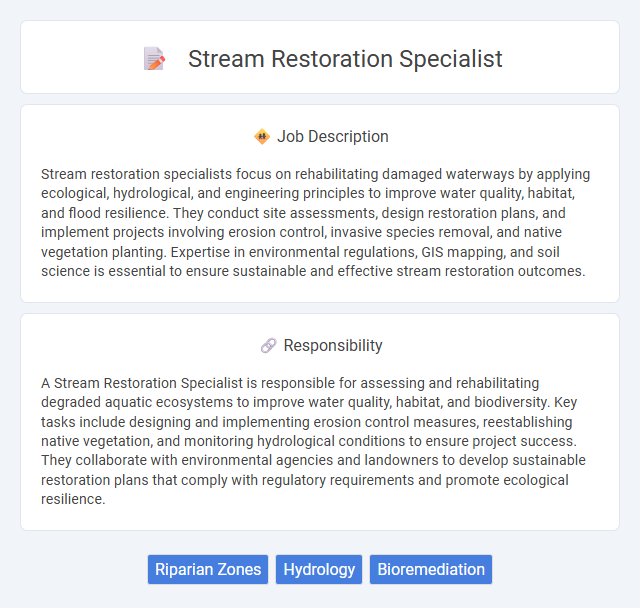
Stream restoration specialists focus on rehabilitating damaged waterways by applying ecological, hydrological, and engineering principles to improve water quality, habitat, and flood resilience. They conduct site assessments, design restoration plans, and implement projects involving erosion control, invasive species removal, and native vegetation planting. Expertise in environmental regulations, GIS mapping, and soil science is essential to ensure sustainable and effective stream restoration outcomes.
Individuals who have a strong interest in environmental science and enjoy hands-on outdoor work might be well-suited for a Stream Restoration Specialist role. Those with physical stamina and problem-solving skills may have a higher probability of thriving in this position, as it often involves fieldwork in varied and sometimes challenging conditions. People who prefer office-based jobs or have limited mobility might find this role less suitable due to its physically demanding nature.
Qualification
Stream restoration specialists typically require a bachelor's degree in environmental science, biology, ecology, or a related field, with many positions favoring advanced degrees. Proficiency in hydraulic modeling, GIS mapping, and knowledge of native riparian vegetation are essential qualifications. Experience with environmental regulations, habitat restoration techniques, and project management further enhances job readiness.
Responsibility
A Stream Restoration Specialist is responsible for assessing and rehabilitating degraded aquatic ecosystems to improve water quality, habitat, and biodiversity. Key tasks include designing and implementing erosion control measures, reestablishing native vegetation, and monitoring hydrological conditions to ensure project success. They collaborate with environmental agencies and landowners to develop sustainable restoration plans that comply with regulatory requirements and promote ecological resilience.
Benefit
Stream restoration specialists likely enhance ecosystem health by improving water quality and habitat conditions, benefiting both wildlife and surrounding communities. Their work probably reduces erosion and flood risks, contributing to long-term environmental sustainability. These benefits may also support regulatory compliance and increase public awareness about conservation efforts.
Challenge
Stream restoration specialists likely encounter complex ecological and engineering challenges that require integrating hydrology, biology, and environmental science. They probably face difficulties in balancing habitat conservation with human activities while addressing issues like erosion, pollution, and invasive species. Navigating regulatory requirements and stakeholder interests may further complicate project implementation and success.
Career Advancement
Stream restoration specialists play a critical role in rehabilitating aquatic ecosystems, offering opportunities to advance into project management and environmental consulting roles. Mastery of hydrology, ecology, and environmental regulations enhances prospects for leadership positions within governmental agencies and private firms. Continuing education and certifications in GIS mapping, environmental impact assessment, and sustainable practices are key to career growth and specialization in this field.
Key Terms
Riparian Zones
A stream restoration specialist expertly rehabilitates riparian zones to improve water quality, enhance wildlife habitats, and prevent erosion. Their work involves assessing streambank stability, planting native vegetation, and designing bioengineering structures to restore natural flow regimes. Mastery of hydrology, ecology, and environmental regulations ensures sustainable restoration that supports biodiversity and ecosystem resilience.
Hydrology
Stream restoration specialists in hydrology analyze and rehabilitate aquatic ecosystems to improve water quality, habitat, and flood control. They apply principles of hydrodynamics, sediment transport, and watershed management to design and implement restoration projects. Proficiency in hydrological modeling software and field data collection is essential for assessing stream flow, erosion, and riparian vegetation health.
Bioremediation
Stream restoration specialists focusing on bioremediation implement natural processes using microorganisms, plants, and enzymes to degrade pollutants and restore water quality in damaged aquatic ecosystems. They design and manage projects that enhance sediment stabilization, nutrient cycling, and contaminant breakdown, improving biodiversity and habitat health. Expertise in hydrology, ecology, and environmental chemistry is essential for optimizing bioremediation strategies in stream restoration efforts.
 kuljobs.com
kuljobs.com